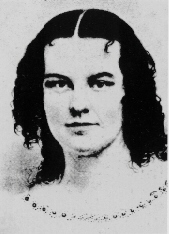“One sees that dead, vacant look steal over the rarest, finest of womens faces . . . in the very midst, it may be, of their warmest summers day; and then one can guess at the secret of intolerable solitude that lies hid beneath the delicate laces . . .”
Miserable enough she looked, lying there on the ashes like a limp,
dirty rag,--yet not an unfitting figure to crown the scene of hopeless
discomfort and veiled crime: more fitting, if one looked deeper into the
heart of things, at her thwarted woman's form, her colorless life, her
waking stupor that smothered pain and hunger,--even more fit to be a
type of her class. Deeper yet if one could look, was there nothing worth
reading in this wet, faded thing, halfcovered with ashes? no story of a
soul filled with groping passionate love, heroic unselfishness, fierce
jealousy? of years of weary trying to please the one human being whom
she loved, to gain one look of real heart-kindness from him? If
anything like this were hidden beneath the pale, bleared eyes, and dull,
washed-out-looking face, no one had ever taken the trouble to read its
faint signs: not the half-clothed furnace-tender, Wolfe, certainly. Yet
he was kind to her: it was his nature to be kind, even to the very rats
that swarmed in the cellar: kind to her in just the same way. She knew
that. And it might be that very knowledge had given to her face its
apathy and vacancy more than her low, torpid life. One sees that
dead, vacant look steal sometimes over the rarest, finest of women's
faces,--in the very midst, it may be, of their warmest summer's day; and
then one can guess at the secret of intolerable solitude that lies hid
beneath the delicate laces and brilliant smile. There was no warmth, no
brilliancy, no summer for this woman; so the stupor and vacancy had time
to gnaw into her face perpetually. She was young, too, though no one
guessed it; so the gnawing was the fiercer.
She lay quiet in the dark corner, listening, through the monotonous din
and uncertain glare of the works, to the dull plash of the rain in the
far distance, shrinking back whenever the man Wolfe happened to look
towards her. She knew, in spite of all his kindness, that there was that
in her face and form which made him loathe the sight of her. She felt by
instinct, although she could not comprehend it, the finer nature of
the man, which made him among his fellow-workmen something unique, set
apart. She knew, that, down under all the vileness and coarseness of his
life, there was a groping passion for whatever was beautiful and pure,
that his soul sickened with disgust at her deformity, even when his
words were kindest. Through this dull consciousness, which never left
her, came, like a sting, the recollection of the dark blue eyes and
lithe figure of the little Irish girl she had left in the cellar.
“Reform is born of need, not pity. No vital movement of the people has worked down, for good or evil; fermented, instead, carried up the heaving, cloggy mass.”
Let them have a clear idea of the
rights of the soul, and I'll venture next week they'll strike for higher
wages. That will be the end of it."
"Will you send the coach-driver to this side of the mills?" asked Kirby,
turning to Wolfe.
He spoke kindly: it was his habit to do so. Deborah, seeing the puddler
go, crept after him. The three men waited outside. Doctor May walked up
and down, chafed. Suddenly he stopped.
"Go back, Mitchell! You say the pocket and the heart of the world
speak without meaning to these people. What has its head to say? Taste,
culture, refinement? Go!"
Mitchell was leaning against a brick wall. He turned his head
indolently, and looked into the mills. There hung about the place a
thick, unclean odor. The slightest motion of his hand marked that he
perceived it, and his insufferable disgust. That was all. May said
nothing, only quickened his angry tramp.
"Besides," added Mitchell, giving a corollary to his answer, "it would
be of no use. I am not one of them."
"You do not mean"--said May, facing him.
"Yes, I mean just that. Reform is born of need, not pity. No vital
movement of the people's has worked down, for good or evil; fermented,
instead, carried up the heaving, cloggy mass. Think back through
history, and you will know it. What will this lowest deep--thieves,
Magdalens, negroes--do with the light filtered through ponderous Church
creeds, Baconian theories, Goethe schemes? Some day, out of their bitter
need will be thrown up their own light-bringer,--their Jean Paul, their
Cromwell, their Messiah."
"Bah!" was the Doctor's inward criticism. However, in practice, he
adopted the theory; for, when, night and morning, afterwards, he prayed
that power might be given these degraded souls to rise, he glowed at
heart, recognizing an accomplished duty.
Wolfe and the woman had stood in the shadow of the works as the coach
drove off. The Doctor had held out his hand in a frank, generous way,
telling him to "take care of himself, and to remember it was his right
to rise." Mitchell had simply touched his hat, as to an equal, with a
quiet look of thorough recognition. Kirby had thrown Deborah some money,
which she found, and clutched eagerly enough.
